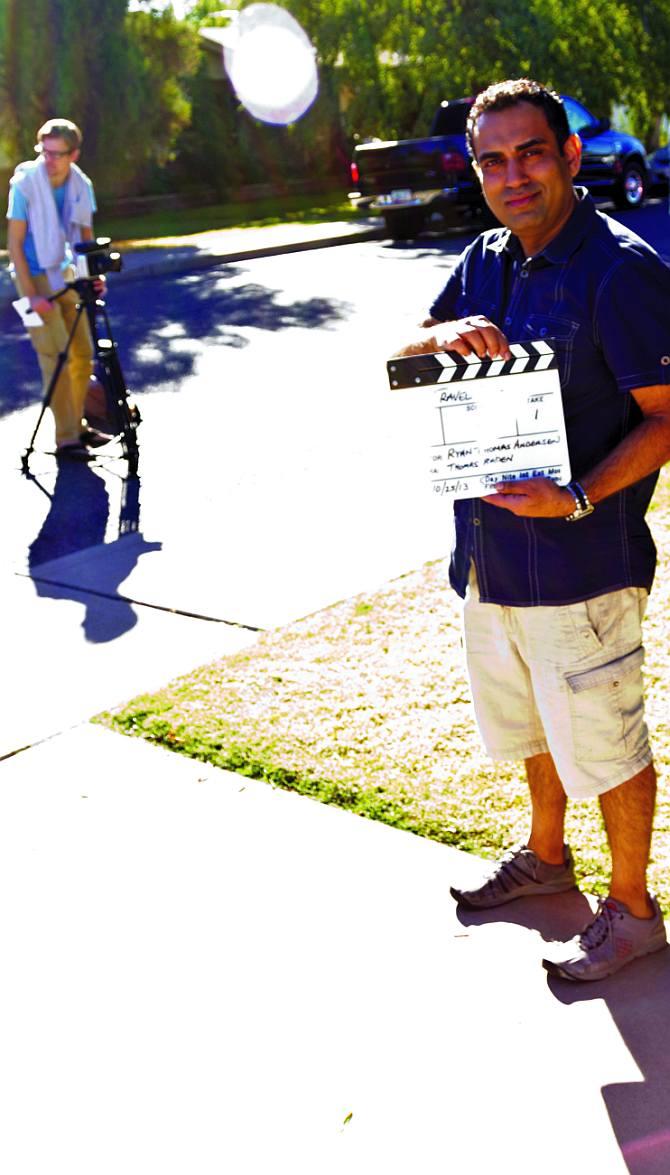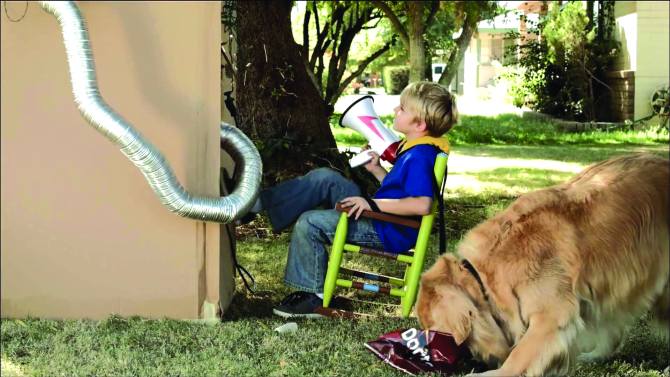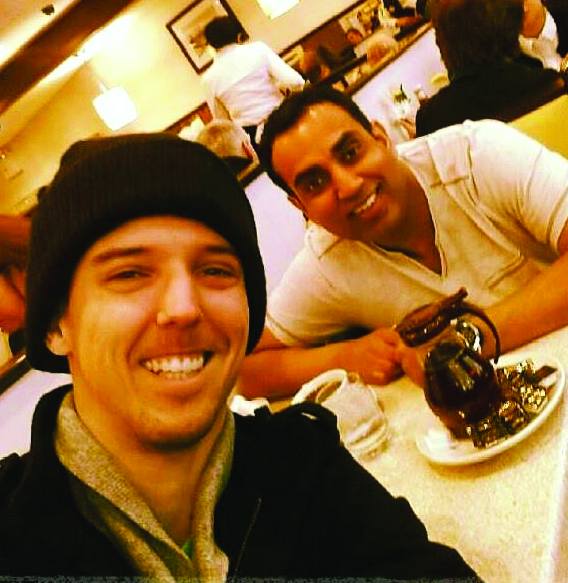Photographs: Raj Suri Chaya Babu
Raj Suri, producer of the now famous Super Bowl Doritos commercial, speaks to Chaya Babu about being stretched thin between a day job and his passion and the big win that makes it all worth it
Just like most Indians of the older generation, Raj Suri’s parents thought his acting and production career was just a hobby, especially since he does it on the side of his job at Intel. That was until he produced a commercial that aired during the Super Bowl.
On February 2, when Suri and Ryan Thomas Andersen, director of the Doritos Time Machine commercial, sat in the Doritos suite at the Super Bowl with the four other Doritos Crash the Super Bowl finalists, none of them knew which two commercials -- out of 5,500 submissions -- would air.
One would be the $1 million winner, decided by public voting; the other, chosen by Doritos, would take home $50,000.
When Suri and Anderson’s commercial showed up in the first quarter of the Denver Broncos vs Seattle Seahawks game -- to be viewed by more than 110 million viewers -- there was screaming and crying, respectively.
“It’s a special moment,” said Suri. “All the hard work you did kind of built up to that one moment.”
That was just the beginning. His ad earned the $1 million win; was ranked the second best of the Super Bowl, right behind the viral Budweiser ad, by a CBS analysis; earned a mention on the USA Today’s consumer judged ad meter for Super Bowl Commercials and had aired 85 times in nine days.
Their win was particularly notable considering their budget: $300 in a mega-bucks race.
Anderson, a freelance wedding photographer, and Suri, a software-engineer-turned-systems-analyst who helps produce transistors that go into computer brain chips, co-wrote the ad, which shows a boy tricking a man into giving up his bag of Doritos in exchange for a try in the boy’s cardboard time machine.
The idea came from Andersen’s son Gavin, a 6-year-old who kept asking for a time machine after watching Back To The Future.
Techie's $300 ad wins million dollar prize!
Image: A scene from the Super Bowl Doritos commercialThe cast consisted of the little boy Jimmy, played by Gavin; the dog, played by the Andersens’ Hogan; the man, Mr Smith, played by Daved Wilkins; and ‘Old Man Jim,’ played by Jim Coates. The latter two, as well as the rest of the crew, loved the idea so much that they agreed to be a part of the challenge and help with the commercial for free.
Suri and Andersen shot it barebones at Anderson’s parents’ house -- a free location of course -- in 8 hours.
It took 80 hours to edit, Suri has said, and then he tapped his inner engineer and Microsoft Excel to create a plan to promote the ad and garner votes. This was the fourth year in a row that he had produced a commercial -- all low budget, but not as low as $300 -- for this competition, but this was the first year that he made it as a finalist.
“It was incredible to win a million dollars,” Suri said, explaining that the prize would be split between eight people. “I’m fairly certain we will all pay some bills and buy a few nice things. We are used to producing things with a limited budget. I think we’ll be able to change that now.”
Amidst the hoopla of media requests and congratulations -- and his parents’ newfound appreciation for his second career, which is clearly much more than a hobby -- Suri took the time to recount his path into television and films.
“Growing up, I had two passions: Computers and baseball,” he said.
Neither of these things say commercials or football, but he got there: “I kind of knew going into high school that I would probably study computer science. I wasn’t very good at baseball, as much as I liked it.”
“I went out for the baseball team every year between freshman and junior year and I always got cut. Then one year, I had the choice between trying out for the baseball team again, or trying out for the school play. I couldn’t do both because they were at the same time. That year, I hung up the cleats and went out for acting. That kind of got it all started. That kind of put the bug in me.”
Suri acted in two or three plays throughout the rest of high school, but then this all got put on the backburner while focusing on his computer science degree at Virginia Tech.
He graduated in 1997 and moved to Arizona for his first job at Intel, but his old love for acting remained in the back of his mind as something he hoped to return to.
In 2004, he did.
During one of those odd life moments when you take a moment and remember what matters, Suri asked himself what he had truly enjoyed doing once upon a time. And in a drastic and spontaneous move, he left Intel to give acting a real go.
“I just made up my mind that I was going to be in a commercial,” he said. “I had no idea what that meant; I didn’t know what to do; I just went to the library and got a book about how to be in commercials.”
All things considered, he got pretty lucky.
In his first year, he got booked for a national Mazda commercial. He felt pumped and was ready for more. Little did he know that he wouldn’t get cast in another commercial for 4 years.
He didn’t give up. He just returned to Intel and had another career on the side.
Techie's $300 ad wins million dollar prize!
Image: Raj Suri with Ryan Thomas Andersen, director of the Doritos Time Machine commercialHe had tried to see what it was like to make acting his main event, but he decided ultimately he needed to do both. And he makes both work.
Not insignificantly, he met his wife in Phoenix at the same time, which influenced his decision about a potential move to Los Angeles, the obviously better option for aspiring actors.
“I wondered a lot: ‘How could I pursue this without totally being poor and having no job in LA and just getting by?’” he said. “It was interesting brainstorming various options. Long story short is that I didn’t go based on my life circumstances at the time.”
“I started to say, ‘Well, how can I advance my acting career in Phoenix while doing this software engineering thing?’ My first thought was to try producing things, either with me in them or not. That way I could make something that could possibly be discovered and have potential to pop.”
Since then, Suri has been juggling his job at Intel (which also involved the role change to systems analyst), the acting and producing, and being a husband and father.
This means having his agent schedule auditions during lunch, taking a vacation day if he needs to when shooting a commercial, and working nights and weekends on independent film and TV projects with people who have similar commitments to busy day jobs.
“I was exhausted by the end of it,” he said of his recent run of shooting an indy TV pilot, which was five days of extremely long weekend hours and late nights after being in the office all day. “But that’s how you make it work. It really stretches you thin though. You just do what you can.”
Suri’s IMDB page lists his many roles over the years, some of which felt like milestones for him and others less notable.
The Mazda ad was a big break for him in a way, opening doors to his later work.
He had a supporting role in Dark Places, a 2005 feature film that went straight to DVD, but received distribution, which is a big deal for an independent film.
In 2009, he had a substantial role in Red Corvette, shot in Arizona and screened at the Phoenix Film Festival, and then a small role in Middle Men, a feature with big names like Luke Wilson and Giovanni Ribisi, which ended up getting picked up by Paramount Pictures.
His biggest milestone was Random Doors, a 2012 feature film in which he plays the lead, Detective Randalph.
As one of the only professional Indian actors in Arizona, Suri faces little competition for parts that are looking to cast a South Asian man. He admitted he was guilty early in his career of taking on stereotypical roles, but feels that both he and the industry have changed a bit.
“As a beginning actor, you’re trying to get work and you’ll just do whatever, but as you go on you realise it’s just not funny or you don’t need to do that anymore,” he said.
And overall, he has found that his ethnicity has only partly impacted his experience, especially in independent films where they are just looking for good talent.
“I’m not being asked to do that (anymore), so that’s what’s cool -- no one’s asking me to come in and do a stupid accent or anything. I think it’s getting a lot better. If you look at guys like Aziz Ansari and Kal Penn, they don’t play roles that are anything remotely like what you’d have seen an Indian guy play 10 years ago.”
With so much open to him in an evolving industry, a $300 30-second video clip shot in a backyard winning $1 million has huge implications for what could be ahead.
“It creates a lot of anxiety because I feel like the next thing I produce has to top the Super Bowl commercial,” he said, laughing. “Like, what can I come out with that would be remotely on this scale? But I’ve just been trying to soak up this moment and catch my breath a little bit.”





Comment
article